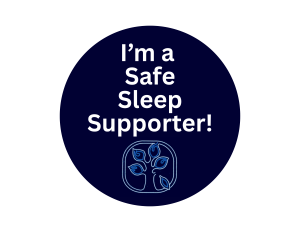
Your pediatrician can be your most trusted partner in your baby's health and safety. Sometimes, parents will avoid certain topics with their pediatricians out of fear of judgment. However, openly discussing your sleep plans, such as room sharing or co-sleeping, will allow you to get important information about your baby’s safety and make the best decisions for safe sleep. Your pediatrician can provide evidence-based guidance to help you keep your baby as safe as possible.
Why Your Pediatrician is Key
Your pediatrician has the advantage of medical training combined with an individual understanding of your baby's unique health needs. Your doctor is able to give you personalized advice. In contrast, online childrearing experts or social media influencers have never met your baby. Your baby may need unique care based on a variety of circumstances. After all, what's right for one baby might not be ideal for another.
In addition, your pediatrician can help you differentiate between normal baby sleep behavior and something that might need attention. Doctors are trained to look for certain signals, symptoms, and patterns that could signal an issue. A good pediatrician can also counsel you about SIDS and safe sleep. They can help you create a safe plan for you and your family that is based on your individual situation.
Before the Appointment: Prepare
Pediatrician appointments can feel chaotic because you have a baby with you! Try to prepare ahead of time so that you can have a productive conversation while you are in the office.
List your questions
Jot down your questions about your baby's sleep, SIDS, and any concerns you have. You can use your phone or pen and paper to make your list in the days before your appointment.
Note baby's habits
You may want to keep a brief log of your baby's sleep patterns (how long they sleep, how often they wake, where they sleep) and a feeding schedule for a few days. A log can be helpful when you are sleep-deprived, because the details of your day-to-day schedule may be fuzzy. If you have concerns about the pattern, be sure to bring them up.
Outline your sleep plans
Be ready to share your current sleep setup and any intentions you have (e.g., "We plan to have the baby in a bassinet next to our bed," or "We're considering bed-sharing, but have questions").
Share conflicting advice from family and friends
If you're receiving conflicting advice from family and friends, your pediatrician can help you understand the evidence behind current recommendations and make the best choice.
Questions you can ask your pediatrician
“What are the most important safe sleep rules for my baby?”
Feel free to bring in your baby’s wearable blanket or swaddling materials to get your doctor’s thoughts on what you have chosen. One of the advantages of a pediatric appointment is being in-person, so you can ask about your individual situation.
Ask your pediatrician to help you understand the ABCs of Safe Sleep. Your baby should always sleep Alone, on their Back, in a Crib (or bassinet/play yard) with a bare, firm, flat sleep surface in a Smoke-free environment.
You may also want to ask about offering a pacifier at naptime and bedtime, as studies show it can help reduce SIDS risk (after breastfeeding is well-established).
While SIDS is rare, discussing it openly allows your pediatrician to provide accurate information that applies specifically to your baby.
“Is my baby’s pattern within normal range for their age and stage of development?”
You may want to discuss common sleep patterns, such as the frequent wakings of a newborn, the shift towards longer stretches, and typical sleep regressions. This can help manage your expectations and understand your baby’s developmental stage.
“What Can I Do to Support My Own Sleep Health?”
Parents’ sleep matters, too. Be honest about your own sleep deprivation. Exhaustion can impair judgment, increasing the risk of accidental unsafe sleep situations. Ask for strategies to safely manage fatigue , especially around nighttime feedings.
Navigating the Co-Sleeping (Bed-Sharing) Conversation
Some parents may feel judged or defensive if they want to co-sleep or bed-share. It's crucial to approach this topic with your pediatrician openly, knowing that their primary concern is your baby's safety.
First, the National Institute of Health and the American Academy of Pediatrics (AAP) do not recommend bed-sharing due to the increased risk of SIDS and accidental suffocation. Room-sharing is recommended, but bed-sharing is not.
Be honest with your doctor about why you are considering bed-sharing (e.g., "I'm so exhausted," "I want to maximize bonding," "It's common in our culture"). Your pediatrician can understand your motivations and offer a safer alternative, such as room-sharing.
The safest alternative to bed-sharing: room-sharing
Room-sharing is the AAP-recommended alternative. This means your baby sleeps in their own safe sleep space (bassinet, crib, or play yard) in your bedroom for at least the first six months, and ideally up to a year.
Room-sharing combines the benefits of proximity for feeding and bonding with the safety of a separate sleep surface. It reduces the risk of SIDS by up to 50% because the baby is easily observable and not at risk from adult bedding or accidental overlay.
Be an engaged partner in your baby's care
Talking openly with your pediatrician about your baby's sleep plans and SIDS is one of the most proactive steps you can take to ensure your baby's safety. Your pediatrician is a valuable resource who knows your baby personally. By understanding the AAP's guidelines and prioritizing safe sleep, you're giving your baby the best possible start to life.
About SIDS of Illinois
Sudden Infant Death Services of Illinois, Inc., is a not for profit, 501(c)(3) organization dedicated to the prevention of sudden, unexpected infant death by providing educational programs to families, healthcare professionals, law enforcement, childcare providers, and the general public as well as bereavement services to families and any others who have experienced the tragedy of sudden, unexpected infant death. Donate here to become a Safe Sleep Supporter!
